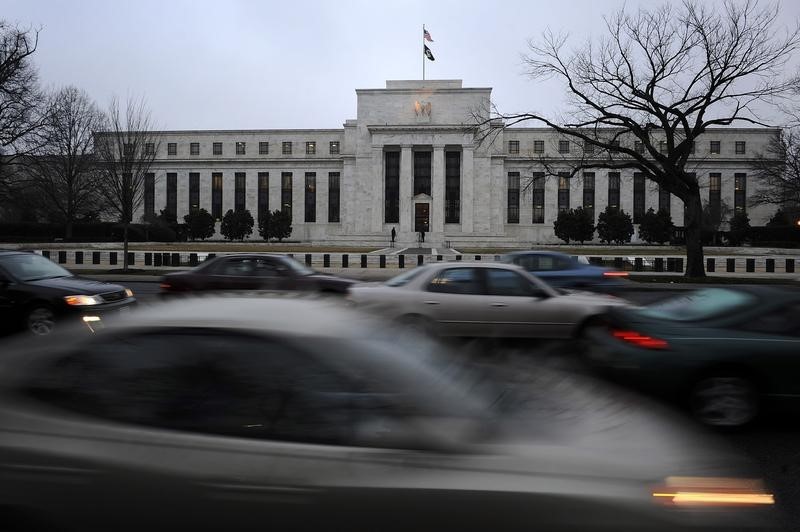Investing.com - The Federal Reserve and the European Central Bank are set to hold their final monetary policy meetings of the year this week, with investors staying focused on trade ahead of the looming Dec. 15 deadline for fresh U.S. tariffs on Chinese goods. Market watchers will also be keenly anticipating the results of the U.K. general election, which will decide the fate of Brexit. Here’s what you need to know to start your week.
- Fed decision
The Fed is expected to hold steady at the conclusion of its meeting on Wednesday after cutting rates three times this year to shield the U.S. economy from a global slowdown. Friday's far stronger-than-expected U.S. jobs report reinforced expectations that policymakers will remain on hold as they monitor the economy.
After the last rate cut, in October, Fed Chair Jerome Powell said both the economy and policy were in a "good place" and indicated that policymakers saw little need to cut rates further.
"I think they are feeling really good right now that they’ve decided to put this thing on pause,” said Tom Porcelli, chief U.S. economist at RBC Capital Markets in New York.
Investors will get the latest consumer price inflation figures ahead of the Fed meeting, which are expected to show inflation running at 2%, while retail sales numbers on Friday are forecast to show growth of 0.4%.
- ECB decision
Christine Lagarde will hold her first meeting and news conference as ECB president on Thursday. Markets are not expecting any changes to monetary policy after the ECB announced fresh stimulus in September and following recent signs that the euro zone economy is bottoming out.
Yet Lagarde's every word will be studied for her thoughts on the monetary policy outlook, the economy and an upcoming strategy review. And after eight years of the straight-talking Mario Draghi, expect the new ECB chief's communication style to also fall under scrutiny.
- Trade wrangling
Beijing and Washington are trying to reach agreement on a 'phase one' trade deal that would cool a 17-month trade war that has roiled financial markets and weighed on global economic growth, but they continue to wrangle over key details.
There is just a week to go until the Dec. 15 deadline for the U.S. to impose tariffs on the remaining $156 billion in Chinese imports and financial markets have been whipsawed by shifts in rhetoric.
U.S. President Donald Trump said on Thursday trade talks with China are "moving right along," striking an upbeat tone even as Chinese officials reiterated that existing tariffs must come off as part of an interim deal. Earlier in the week, though, Trump rattled global markets when he said a deal might have to wait until after the 2020 presidential election.
Data on Sunday showed that China's exports declined for the fourth consecutive month in November, but growth in imports may be a sign that Beijing's stimulus measures are helping to stoke demand.
- U.K. election
More than three years after the U.K. narrowly voted to leave the European Union, the Dec. 12 general election will effectively offer them another vote on how they want Brexit to proceed and if they still think it should go ahead.
Opinion polls showing the Conservative Party with a big lead have fueled a rally in the British pound amid the view that Conservatives will quickly implement Brexit and end the uncertainty that's weighed on the economy since 2016.
But some risks remain. First, the gap between the Conservatives and Labor doesn’t need to narrow much to deliver another hung Parliament. Second, if a Conservative win is already priced in, traders may be tempted to take profits, pushing sterling lower.
After the election, the focus will shift to the 11-month window for Britain to sign trade deals with the EU, a prospect which is likely to keep investors on edge.
- Market volatility
Stocks pulled back from record highs to start December, undermined by comments from Trump suggesting a trade deal with China might have to wait until after the 2020 election. But the market rebounded at the end of the week on Friday's strong U.S. jobs and a change in tone from Trump.
Wall Street could see more volatility ahead of the Dec. 15 tariff deadline. At the start of the week, investors said equity prices were factoring in that those tariffs would be delayed if not canceled, but subsequent tough talk from Trump officials has shaken those expectations somewhat.
"Until we get some finality on this, the day-to-day is going to move on headlines that suggest progress or lack thereof,” said Keith Lerner, chief market strategist at SunTrust Advisory Services in Atlanta.
--Reuters contributed to this report
